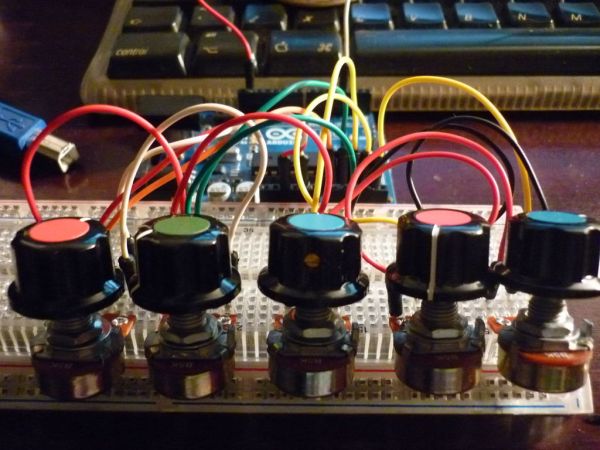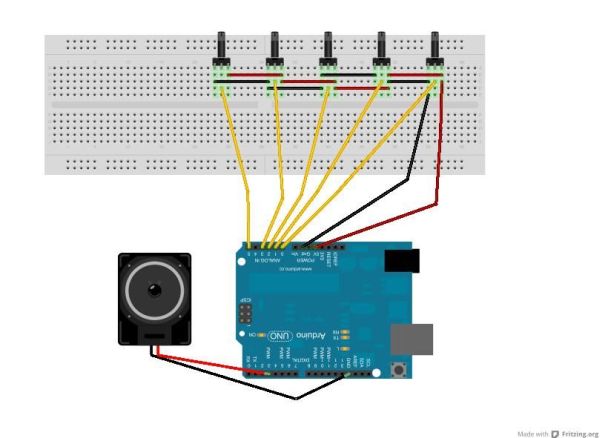Hello again. Today I’d like to show you the Auduino. That’s right, the Auduino is a Lo-fi Granular Synth that works on arduino. It uses some analog pins and a digital pin. I had loads of fun making and playing with it so I’d love to show you how to make it.
Sketch created by Peter Knight, Tinker.it http://tinker.it.
For more information please visit the website.

I hope you are already familiarized with the arduino environment, if not get an arduino and check for more information at arduino.cc
Step 1: Materials
For making this synth you will need:
- X5 5K Potentiometer
- A breadboard.
- An 8 Ohm speaker or a jack.
This you’ll probably have laying around and will be needed:
- Various jumpers
- X1 Arduino (I am using Arduino Uno R2)
Optional:
- X5 Knob (For the Pots)
Step 2: The pots
So the potentiometers go on the breadboard, I couldn’t find the best stop for them because their back part wouldn’t fit. But I managed to squeeze them in at the last row and I flexed the breadboard as shown in the picture.
Basically all there positive leads are connected to 5V and all there negatives are going to ground. And the pots middle lead goes to an analog pin on the arduino.
Pot 1 goes to analog 4.
Pot 2 goes to analog 3.
Pot 3 goes to analog 2.
Pot 4 goes to analog 1.
Pot 5 goes to analog 0.
The pictures show how to connect the jumpers very clear.
Step 3: The speaker
I used a speaker but you can use a jack and connect it to the same arduino pins.

Speaker must go connect to digital 3 on the arduino. And negative to ground…
Step 4: The code
You can download the sketch here or you can just paste the code below on your arduino program and start to upload.
// Auduino, the Lo-Fi granular synthesiser
//
// by Peter Knight, Tinker.it http://tinker.it
//
// Help: http://code.google.com/p/tinkerit/wiki/Auduino
// More help: http://groups.google.com/group/auduino
//
// Analog in 0: Grain 1 pitch
// Analog in 1: Grain 2 decay
// Analog in 2: Grain 1 decay
// Analog in 3: Grain 2 pitch
// Analog in 4: Grain repetition frequency
//
// Digital 3: Audio out (Digital 11 on ATmega8)
//
// Changelog:
// 19 Nov 2008: Added support for ATmega8 boards
// 21 Mar 2009: Added support for ATmega328 boards
// 7 Apr 2009: Fixed interrupt vector for ATmega328 boards
// 8 Apr 2009: Added support for ATmega1280 boards (Arduino Mega)
Speaker
For more detail: Auduino Lo-fi de Synthé pour Arduino
